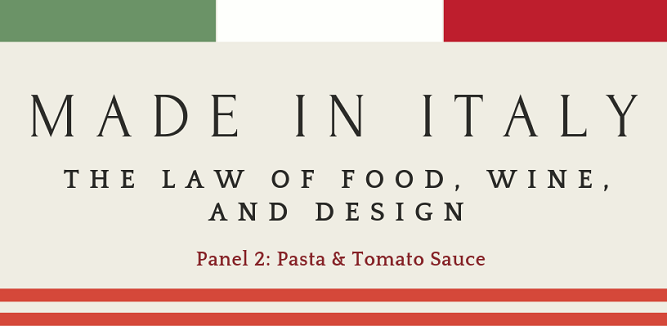
Event Title
Panel 2: Pasta and Tomato Sauce
Location
Large Courtroom, FIU College of Law
Start Date
21-2-2020 11:00 AM
End Date
21-2-2020 12:30 PM
Description
The Magic of Pasta al Dente: The Italian Struggle over Durum Wheat before the European Court of Justice
Fernanda Nicola, American University Washington College of Law
Gino Scaccia, Università degli Studi di Teramo
“La vita è una combinazione di magia e pasta.” - Federico Fellini
By the late 1980s, the liberalization of pasta in Europe, through a ruling of the European Court of Justice (ECJ) in Case 407/85 Drei Glocken v. USL Centro-Sud [1988], lowered the quality of the Italian pasta di grano duro. The case referred by a Bolzano judge to the ECJ in Luxembourg challenged an Italian law that prohibited the marketing of traditional durum wheat pasta as opposed to the soft or mixed grain paste already marketed with the plural version. In this historic judgement, Advocate General Federico Mancini, sided with the Italian government against the European Commission. Yet Mancini’s opinion did not successfully influence the Court that liberalized the use of the term pasta for both durum and soft wheat. Today, Mancini’s opinion remains a quintessential example of the “Italian style”. This entails balanced conceptualism, pragmatism, some folklore, and an impeccable form. At the time, scholars and judges alike criticized Mancini’s reasoning for being too political and folkloristic in defending the benefits of durum wheat pasta as priceless to Italian lifestyle. Thirty years after the ECJ ruling, worldwide gourmet consumers are well aware of the high quality of durum wheat pasta. In 2013, Gragnano D.O.P. pasta, one of the most famous durum wheat pasta, acquired additional protection through a geographical indicator. Looking back, Mancini’s opinion appears well reasoned and avant-guard, especially when anticipating the impact of pasta liberalization on consumer health and development policy in Southern Italy, one of the most successful crop productions of the Mezzogiorno. But mostly, Mancini was right to insist that pasta al dente is inevitably one of the most salient traits of Italian lifestyle.
Gangmastering and the Italian “Passata”: The Legal Construction of Cheap Labor Behind the Globalized Italian Tomato
Tomaso Ferrando, University of Bristol Law School, UK & University of Antwerp, Belgium
Italy is the second producer of tomatoes in the world after the United States, and it is often considered the homeland of this food. Yet, the Italian tomato is much more than Italian. If one considers the people, geography, regulations and history behind the ‘golden pome’ (pomo-d’oro in Italian), there is no other conclusion that it is inherently local and global. In the last years, the Italian tomato Italian sector has been under scrutiny for the reliance on exploited labour, egregious living conditions and the role of organized crime in trading human beings as any other commodity (gangmastering, or ‘caporalato’). By embedding the Italian industrial tomato into a critical and multi-territorial legal approach to the food system, my contribution aims to offer a different perspective on the illegal action of labour intermediation as one of the most discussed issues surrounding the production of Italian tomatoes. Rather than presenting exploitation and caporalato as exceptions, the paper analyses them through the lenses of trade law, competition law and migration law as more appropriate lenses to understand the role of cheap labour in the construction of the global Italian tomato. If that is the case, legal interventions cannot be local and specific, but must be systemic, multi-layered and, therefore, based on dialogue and solidarity among workers, lawyers, activists and academics across the whole tomato chain.
Beyond the junk food versus European PGI, PDO and TSG Certification Marks Divide: When ‘good’ food is illegal
Maria Rosaria Marella, Università degli Studi di Perugia
This essay analyzes the impact of EU law’s certification marks such as “Protected Designation of Origin” (PDO), “Protected Geographical Indication” (PGI), and “Traditional Specialty Guaranteed” (TSG) on the production of food within subsistence economies in Italy. It challenges the creation of certification marks as the right and only way to preserve Italian traditional good food. I argue that, on the contrary, it produces the effect of marginalizing and eventually putting out-of-business the small producers that do not have access to the certification marks circuit nor want to yield to the mass production of food. EU law imposes specific food quality and safety standards based on production and packaging methods that rightly aim to protect the health of consumers, but they require investments that producers in subsistence economies cannot afford. This makes the food that they produce illegal and squeezes them out of the market. Additionally, the EU strategy of preserving traditional foods and food production methods through certification marks creates an elitist supply, destined for an audience of wealthy and educated consumers, while the rest of the market is flooded with standardized and poor industrial food. In this framework the food production from subsistence economies has no more space on the market. Considering that this type of production is at the origin of the Italian good food tradition well known throughout the world, the results of the EU strategy must be critically reconsidered.
A video clip will illustrate this reality through the telltale of some of these small producers
Panel 2: Pasta and Tomato Sauce
Large Courtroom, FIU College of Law
The Magic of Pasta al Dente: The Italian Struggle over Durum Wheat before the European Court of Justice
Fernanda Nicola, American University Washington College of Law
Gino Scaccia, Università degli Studi di Teramo
“La vita è una combinazione di magia e pasta.” - Federico Fellini
By the late 1980s, the liberalization of pasta in Europe, through a ruling of the European Court of Justice (ECJ) in Case 407/85 Drei Glocken v. USL Centro-Sud [1988], lowered the quality of the Italian pasta di grano duro. The case referred by a Bolzano judge to the ECJ in Luxembourg challenged an Italian law that prohibited the marketing of traditional durum wheat pasta as opposed to the soft or mixed grain paste already marketed with the plural version. In this historic judgement, Advocate General Federico Mancini, sided with the Italian government against the European Commission. Yet Mancini’s opinion did not successfully influence the Court that liberalized the use of the term pasta for both durum and soft wheat. Today, Mancini’s opinion remains a quintessential example of the “Italian style”. This entails balanced conceptualism, pragmatism, some folklore, and an impeccable form. At the time, scholars and judges alike criticized Mancini’s reasoning for being too political and folkloristic in defending the benefits of durum wheat pasta as priceless to Italian lifestyle. Thirty years after the ECJ ruling, worldwide gourmet consumers are well aware of the high quality of durum wheat pasta. In 2013, Gragnano D.O.P. pasta, one of the most famous durum wheat pasta, acquired additional protection through a geographical indicator. Looking back, Mancini’s opinion appears well reasoned and avant-guard, especially when anticipating the impact of pasta liberalization on consumer health and development policy in Southern Italy, one of the most successful crop productions of the Mezzogiorno. But mostly, Mancini was right to insist that pasta al dente is inevitably one of the most salient traits of Italian lifestyle.
Gangmastering and the Italian “Passata”: The Legal Construction of Cheap Labor Behind the Globalized Italian Tomato
Tomaso Ferrando, University of Bristol Law School, UK & University of Antwerp, Belgium
Italy is the second producer of tomatoes in the world after the United States, and it is often considered the homeland of this food. Yet, the Italian tomato is much more than Italian. If one considers the people, geography, regulations and history behind the ‘golden pome’ (pomo-d’oro in Italian), there is no other conclusion that it is inherently local and global. In the last years, the Italian tomato Italian sector has been under scrutiny for the reliance on exploited labour, egregious living conditions and the role of organized crime in trading human beings as any other commodity (gangmastering, or ‘caporalato’). By embedding the Italian industrial tomato into a critical and multi-territorial legal approach to the food system, my contribution aims to offer a different perspective on the illegal action of labour intermediation as one of the most discussed issues surrounding the production of Italian tomatoes. Rather than presenting exploitation and caporalato as exceptions, the paper analyses them through the lenses of trade law, competition law and migration law as more appropriate lenses to understand the role of cheap labour in the construction of the global Italian tomato. If that is the case, legal interventions cannot be local and specific, but must be systemic, multi-layered and, therefore, based on dialogue and solidarity among workers, lawyers, activists and academics across the whole tomato chain.
Beyond the junk food versus European PGI, PDO and TSG Certification Marks Divide: When ‘good’ food is illegal
Maria Rosaria Marella, Università degli Studi di Perugia
This essay analyzes the impact of EU law’s certification marks such as “Protected Designation of Origin” (PDO), “Protected Geographical Indication” (PGI), and “Traditional Specialty Guaranteed” (TSG) on the production of food within subsistence economies in Italy. It challenges the creation of certification marks as the right and only way to preserve Italian traditional good food. I argue that, on the contrary, it produces the effect of marginalizing and eventually putting out-of-business the small producers that do not have access to the certification marks circuit nor want to yield to the mass production of food. EU law imposes specific food quality and safety standards based on production and packaging methods that rightly aim to protect the health of consumers, but they require investments that producers in subsistence economies cannot afford. This makes the food that they produce illegal and squeezes them out of the market. Additionally, the EU strategy of preserving traditional foods and food production methods through certification marks creates an elitist supply, destined for an audience of wealthy and educated consumers, while the rest of the market is flooded with standardized and poor industrial food. In this framework the food production from subsistence economies has no more space on the market. Considering that this type of production is at the origin of the Italian good food tradition well known throughout the world, the results of the EU strategy must be critically reconsidered.
A video clip will illustrate this reality through the telltale of some of these small producers

